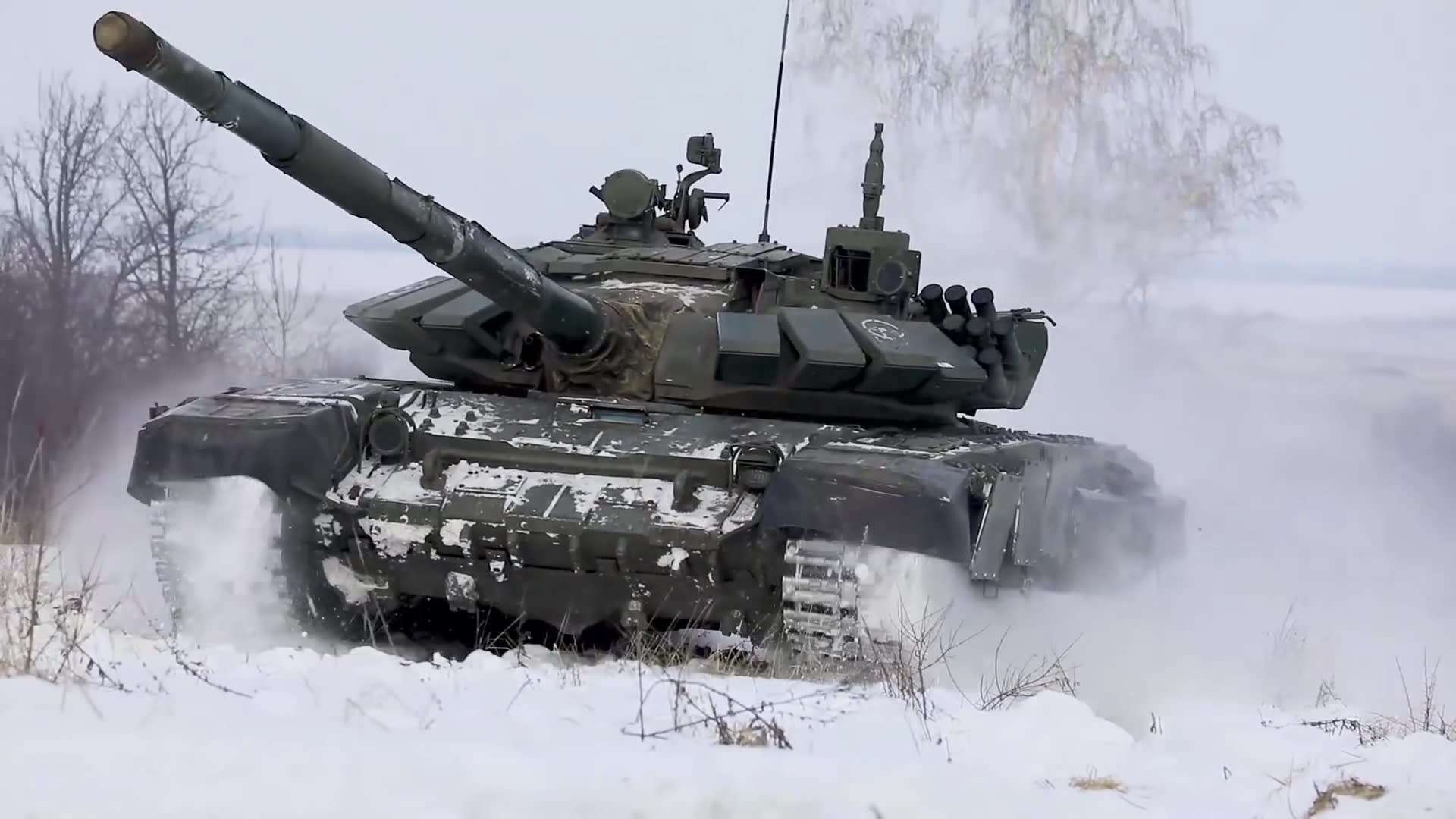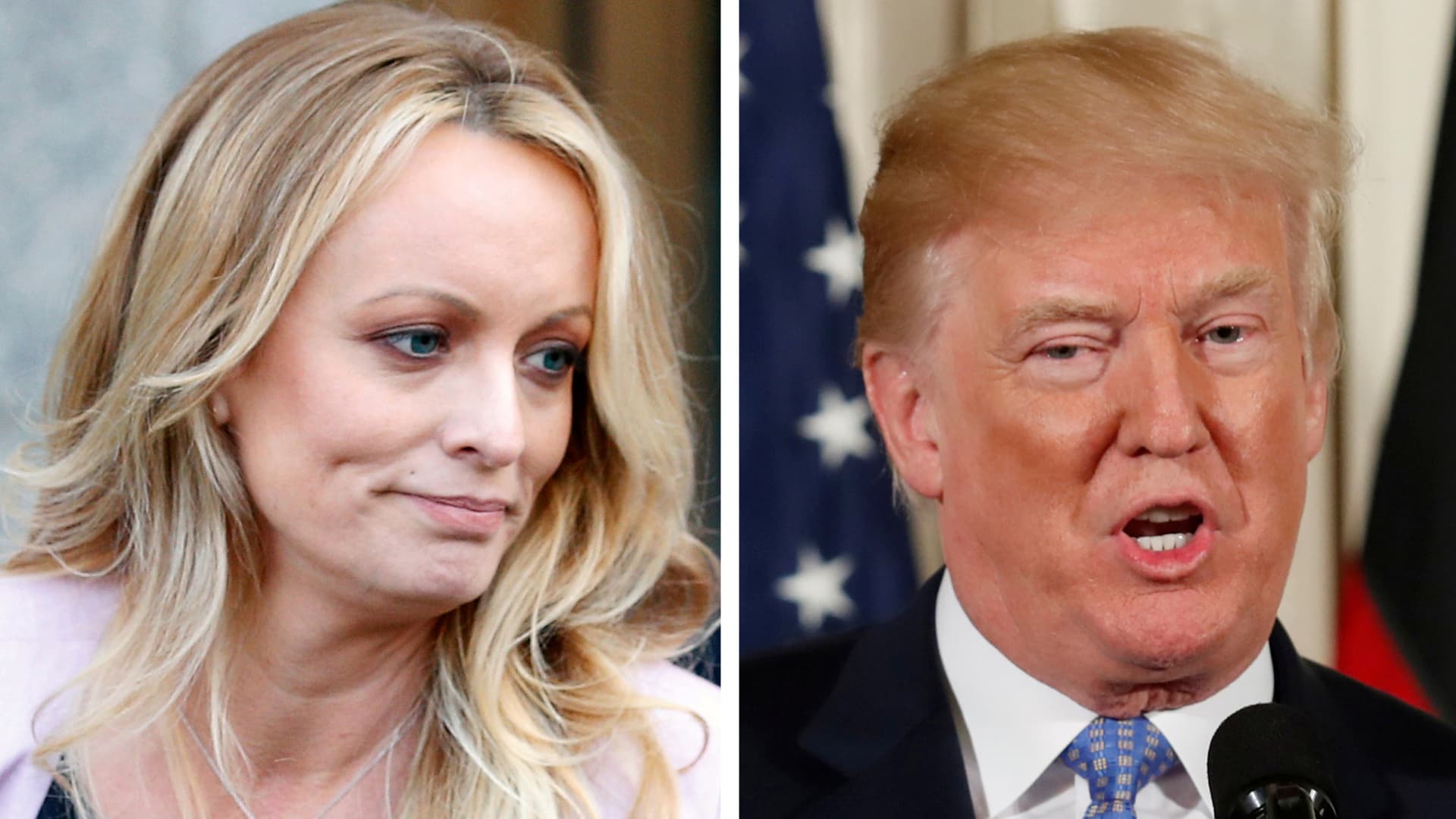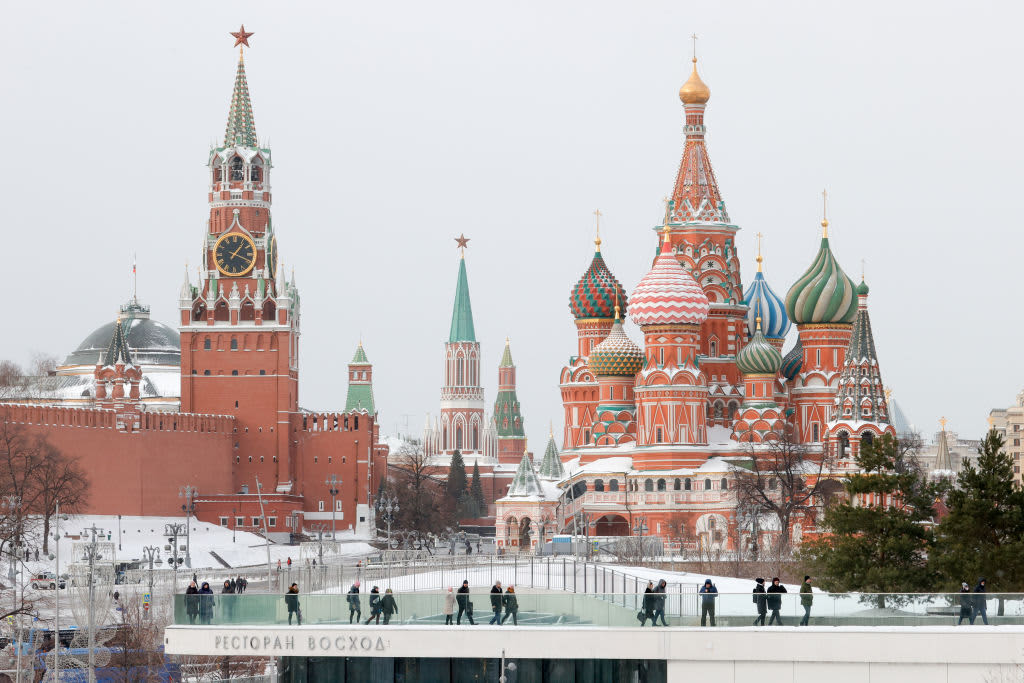Ukraine concerns ease as Russia says it's begun a partial pullback of troops
Russia's Defense Ministry has announced it is sending some troops at the Ukrainian border back to their bases.

T-72B3 Main Battle Tanks of Russian Army take part in a military drill in St. Petersburg, Russia on February 14, 2022.
Russian Defense Ministry | Anadolu Agency | Getty Images
Moscow is starting to return some troops at the Ukrainian border to their bases, the Russian government announced Tuesday.
In a statement, Igor Konashenkov, a spokesman for the Russian Ministry of Defense, said troops who had recently been posted to Russia's southern and western military districts — which share a border with Ukraine — had completed their military drills and "have already begun loading onto rail and road transport and will begin moving to their military garrisons today."
Konashenkov also announced that Russian troops currently engaged in military drills in neighboring Belarus, which shares a border with Ukraine to the latter's north, would return to their permanent bases when the exercises ended on Feb. 20.
He added that military exercises would continue elsewhere in Russia, and a live fire drill was scheduled to go ahead in Belarus on Saturday. Naval drills are still underway, Konashenkov said.
"The troops of the Eastern Military District and the Airborne Troops participating in this exercise, in cooperation with the Belarusian Armed Forces, are practicing the issues of repelling aggression against the Union State during a defensive operation," he added.
Thousands of Russian troops began engaging in military drills last week in a move that was widely seen as a display of strength by Moscow. The drills came as more than 100,000 soldiers, tanks, missiles and even fresh blood supplies had been moved to Russia's border with Ukraine.
Moscow has repeatedly insisted it has no plans to invade Ukraine, despite warnings from Western countries in recent days that an invasion is likely to be imminent.
Win for the West?
Timothy Ash, emerging markets senior sovereign strategist at BlueBay Asset Management, said in a note on Tuesday that "if Putin has really blinked, this would be huge win for Biden, [Ukrainian President Volodymyr] Zelenskyy and the West."
"They called out Putin for threats [and] menacing military actions and failed to concede anything much on Putin's red lines," he said.
Ash added that it would be difficult to see the entire situation as anything but a big defeat for Putin.
"What did he achieve?" he said. "He managed to rally the West back around NATO, which again has common purpose. Ukrainian sovereignty [has been] affirmed, even strengthened."
As a result of Russia's aggressive activity, Ukraine's military was now better armed and better able to defend itself, Ash added.
"Russia has been called out as an unreliable energy supplier — the West will accelerate diversification away from Russian energy sources," he said. "[Putin's] bluff was called. He may have written a long essay over the close historical links between Russia and Ukraine, but some will say he was the Russian leader who actually lost Ukraine. That will be his mark in history — he accelerated Ukraine's Western orientation."
Diplomacy 'far from exhausted'
In a televised exchange on Monday, Russian Foreign Minister Sergey Lavrov told President Vladimir Putin that the avenues the Kremlin could use to secure the security guarantees it has demanded — including diplomacy — "are far from exhausted."
While Lavrov suggested continuing along the diplomatic route, he added: "We have already warned more than once that we will not allow endless negotiations on questions that demand a solution today."
Russia is demanding that Ukraine never be permitted to become a NATO member, and has said it wants the organization to roll back its presence in Eastern Europe.
Addressing the Ukrainian population on Monday, the country's President Volodymyr Zelenskyy said Ukraine "wants peace and we want to resolve all issues exclusively through negotiations." But he added that Ukraine could respond to any aggression with its "great army" that has "unique combat experience and modern weapons."
In a phone call on Monday, U.S. President Joe Biden and U.K. Prime Minister Boris Johnson agreed that "a crucial window for diplomacy" still remained.
Biden and Johnson agreed that "any further incursion into Ukraine would result in a protracted crisis for Russia, with far reaching damage for both Russia and the world," and that a significant package of sanctions — including reducing European countries' reliance on Russian gas — would be imposed if Russian aggression escalated.
On Tuesday, Polish Foreign Minister Zbigniew Rau — the current chairman of the Organization for Security and Cooperation in Europe — is due to convene talks in Moscow between Lavrov and the OSCE's chairperson-in-office in Ukraine, Mikko Kinnunen.
Meanwhile, German Chancellor Olaf Scholz is due to touch down in Moscow on Tuesday to meet with Putin. Scholz met with Zelenskyy in Kyiv on Monday.
Berlin is not expecting "concrete results" from the talks in Russia on Tuesday, according to Reuters, but Scholz is expected to emphasize that the Kremlin "should not underestimate the unity between the European Union, United States and Britain."
War could break out 'any day now'
Despite signals from various parties that diplomatic efforts to alleviate the situation are still on the table, the U.S. has warned that an invasion could still be imminent.
Secretary of State Antony Blinken ordered the U.S. Embassy in Kyiv to close on Monday, relocating staff to the city of Lviv in western Ukraine.
Meanwhile, British Foreign Minister Liz Truss told Sky News on Tuesday that "it is still the case that an invasion could be imminent, and it is highly likely."
U.S. national security advisor Jake Sullivan told CNN on Sunday that a Russian attack on Ukraine could happen "any day now." "That includes this coming week," he said.
Security officials in Washington, London and Ukraine told Politico on Friday that U.S. intelligence officers had briefed allies last week that the invasion may begin on Wednesday Feb. 16. However, Sullivan said on Sunday that officials "cannot perfectly predict the day."
According to thinktank Chatham House, recent research suggests one in four Ukrainians would be willing to physically defend their country if Russia were to invade.

 Tekef
Tekef 
































